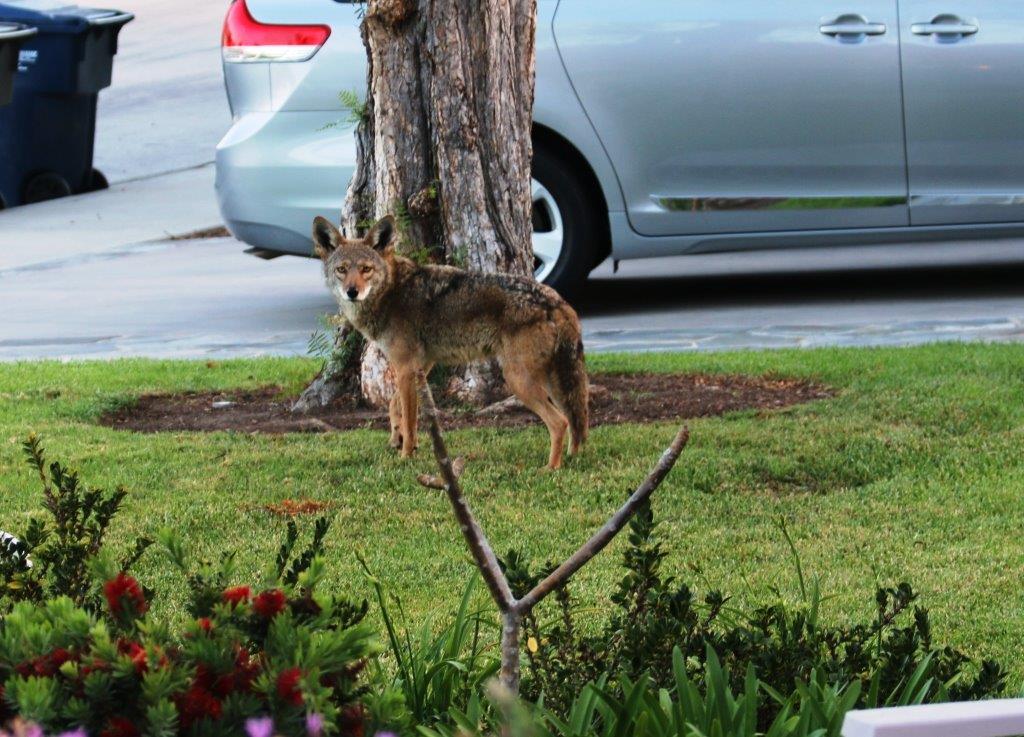Urban Coyotes A Focus Again After Litter Makes Home In San Francisco Park

Around the same time as the California Department of Fish and Wildlife announced a second online seminar about coyotes in urban and suburban cities, San Francisco is the proud godparents of a new litter of pups making a home in a city park.
Here’s the San Francisco Chronicle on the new babies holding court in the City by the Bay:
The coyote den is in an a isolated part of the garden, between the succulent garden and the park nursery. Part of the area was already closed due to construction, and signage denoting an “Active Coyote Den Area” was installed Monday, according to Tamara Aparton, spokesperson for the San Francisco Recreation and Parks Department.
“I want to stress this isn’t unusual,” Aparton said in an email. “Coyote denning is a yearly occurrence in our parks. Human visitors are not in danger, but should stay away during this sensitive time for the coyote family and report sightings to animal control.”
Deb Campbell, spokesperson for San Francisco Animal Care & Control, said that a coyote family has been living in the Botanical Garden for years, and that sightings have often been reported in the spring.
Here’s the CDFW release on the upcoming second coyote seminar:
Due to an increase in the number of reported conflicts between humans and coyotes in California, a series of online-based workshops are helping local communities and residents understand the reasons for that increase and how to reduce future conflicts.
The second workshop offered by the California Fish and Game Commission and California Department of Fish and Wildlife (CDFW) is scheduled for May 28, 2021.The focus will be on effective educational campaigns and coyote management plans. People interested in participating in this conversation about coyotes in the urban environment can visit the Commission website to learn how to join the workshop.
“We had an impressive group of participants at the first workshop, with lots of good information shared and with great questions and engaging dialogue,” said Commissioner Eric Sklar, chair of the commission’s Wildlife Resources Committee. “I look forward to the next workshop where we will learn more about education campaigns and coyote management plans that will help us collectively address increasing human interactions with coyotes in our urban environments.”
The principal reasons wildlife, including coyotes, ventures into populated areas is to search for food, water or shelter. Human-coyote interactions are on the rise for many reasons, including increased urbanization, availability of food and water sources, and access to attractants such as pet food, human food, pets and small livestock. Increased interactions can lead to human-coyote bites, pet loss (depredation) and disease transmission concerns. Adaptive, integrated strategies exist to mitigate conflicts and address concerns.
“As native terrestrial predators, coyotes are an integral and valuable part of California’s natural wildlife and ecosystem,” said CDFW Wildlife Branch Chief Scott Gardner. “To ensure effective conflict mitigation, safe co-existence and long-term predator conservation, the best available science and all available management tools should be considered. CDFW supports local communities in taking an adaptive approach to develop integrated coyote management plans and outreach strategies. A diverse set of tools is vital to address, reduce and manage conflict.”
CDFW and the Commission expect these workshops will provide an inclusive virtual platform for meaningful discussion on human-coyote conflicts and integrated coyote management planning. The first workshop was focused on the science and research related to coyotes in the urban environment as well as the current laws, regulations and jurisdictional roles that create a foundation for communities to reduce human-coyote interactions; the first workshop video is available here.
WHAT: Coyotes in the Urban Environment Workshop Series
WHEN: May 28, 2021 (9 a.m. to 12 p.m.) – Workshop 2 (Education Campaigns and Management Plans)
WHERE: Participants will join via Zoom and are asked to register in advance; those who register early will have an opportunity to take an online survey. Visit the Commission website or CDFW Facebook page for invite information.



